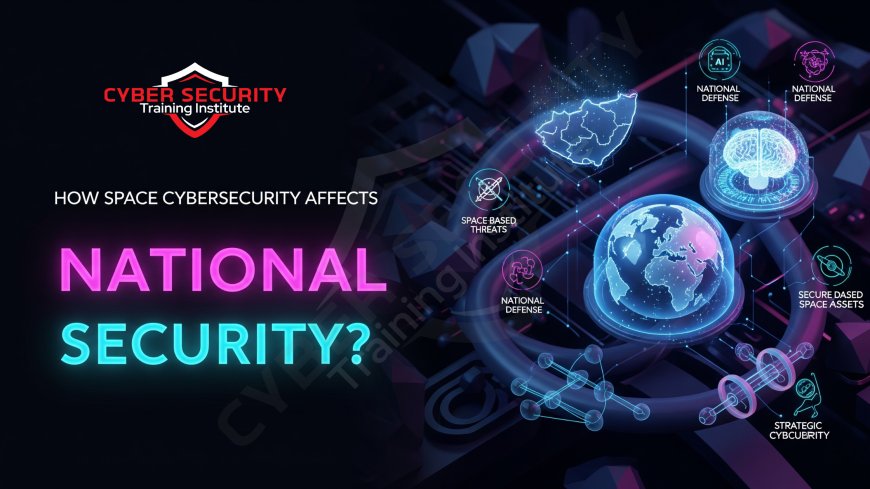How Space Cybersecurity Affects National Security
In today’s interconnected world, space is no longer just a frontier for exploration—it’s a critical domain for national security. Satellites orbiting Earth power everything from GPS navigation to military communications, weather forecasting, and global internet access. But with this reliance comes a growing threat: cyberattacks targeting space systems. Space cybersecurity, the practice of protecting satellites, ground stations, and space-based networks from digital threats, is now a cornerstone of national security. A single breach could disrupt economies, compromise defense systems, or even escalate international conflicts. This blog explores how space cybersecurity intersects with national security, why it matters, and what’s at stake if we fail to protect our assets in orbit.

Table of Contents
- The Importance of Space in Modern Society
- Cybersecurity Threats in Space
- How Space Cybersecurity Impacts National Security
- Strategies to Strengthen Space Cybersecurity
- Challenges in Securing Space Systems
- Conclusion
- Frequently Asked Questions
The Importance of Space in Modern Society
Space is often called the ultimate high ground, but its role extends far beyond military strategy. Satellites enable critical functions that underpin daily life and national security:
- Communication: Satellites facilitate global phone calls, internet access, and secure military communications.
- Navigation: GPS, powered by satellites, guides everything from civilian navigation apps to precision-guided munitions.
- Surveillance: Reconnaissance satellites provide intelligence on potential threats, monitor borders, and track natural disasters.
- Scientific Research: Space-based telescopes and sensors collect data on climate, weather, and cosmic phenomena.
These systems are vital to governments, militaries, and civilians alike. A disruption in satellite services could cause chaos, from grounded flights to interrupted financial transactions. This reliance makes space systems prime targets for cyberattacks, which could have cascading effects on national security.
Cybersecurity Threats in Space
Cyberattacks on space systems are not science fiction—they’re already happening. Hackers, state-sponsored actors, and even rogue groups target satellites and their supporting infrastructure. Here are some common threats:
- Signal Jamming: Attackers send interfering signals to disrupt satellite communications, rendering them unreliable.
- Data Interception: Hackers intercept sensitive data, like military communications or location information, transmitted via satellites.
- Command and Control Attacks: Malicious actors gain access to a satellite’s control systems, potentially altering its orbit or disabling it.
- Ground Station Breaches: Ground stations, which communicate with satellites, are vulnerable to hacking, allowing attackers to manipulate satellite operations.
- Supply Chain Attacks: Compromised software or hardware in satellite systems can introduce vulnerabilities before a satellite even launches.
The table below summarizes these threats and their potential impacts:
| Threat | Description | Potential Impact |
|---|---|---|
| Signal Jamming | Disrupting satellite signals to block communication. | Loss of GPS, interrupted communications. |
| Data Interception | Stealing data transmitted via satellites. | Compromised military or commercial secrets. |
| Command and Control Attacks | Hijacking satellite operations. | Satellite failure or weaponization. |
| Ground Station Breaches | Hacking ground-based control systems. | Loss of satellite control, data manipulation. |
| Supply Chain Attacks | Compromising satellite components pre-launch. | Long-term vulnerabilities in space systems. |
How Space Cybersecurity Impacts National Security
The consequences of a cyberattack on space systems are profound, directly affecting a nation’s ability to defend itself and function effectively. Here’s how:
- Military Operations: Modern militaries rely on satellites for real-time intelligence, navigation, and communication. A cyberattack could blind a nation’s defense systems, leaving it vulnerable to physical or strategic attacks.
- Economic Stability: Satellites support global trade, banking, and supply chains. A disruption could halt financial markets or delay critical shipments, causing economic turmoil.
- Public Safety: Weather satellites provide early warnings for natural disasters. A cyberattack could delay or falsify these warnings, endangering lives.
- International Relations: A state-sponsored attack on another nation’s satellites could be seen as an act of war, escalating tensions or triggering conflicts.
For example, in 2022, a cyberattack disrupted satellite internet services in Ukraine during the early stages of the Russia-Ukraine conflict, affecting both civilian and military communications. Such incidents highlight how space cybersecurity failures can destabilize nations.
Strategies to Strengthen Space Cybersecurity
Protecting space systems requires a multi-faceted approach. Governments, private companies, and international organizations must collaborate to secure this critical domain. Key strategies include:
- Encryption: Using strong encryption to protect data transmitted between satellites and ground stations prevents interception.
- Redundancy: Building backup systems, such as additional satellites or ground stations, ensures continuity if one system is compromised.
- Regular Audits: Conducting cybersecurity audits of space systems helps identify and patch vulnerabilities before they’re exploited.
- International Cooperation: Nations must work together to establish norms and treaties for responsible behavior in space, reducing the risk of state-sponsored attacks.
- Private Sector Involvement: Companies like SpaceX and Boeing, which operate satellites, must prioritize cybersecurity in their designs and operations.
By implementing these measures, nations can reduce the risk of cyberattacks and strengthen their space infrastructure.
Challenges in Securing Space Systems
Securing space systems is no easy task. Several challenges complicate efforts to protect this domain:
- Complexity: Satellites and ground stations involve intricate hardware and software, making it hard to secure every component.
- Cost: Developing and maintaining secure systems is expensive, and budget constraints can limit investment in cybersecurity.
- Global Nature: Space is a shared domain, and vulnerabilities in one nation’s systems can affect others, requiring global coordination.
- Rapidly Evolving Threats: Cybercriminals and state actors continuously develop new attack methods, outpacing defensive measures.
Addressing these challenges requires sustained investment, innovation, and international collaboration to keep pace with evolving threats.
Conclusion
Space cybersecurity is not just a technical issue—it’s a critical component of national security. As our reliance on satellites grows, so does the risk of cyberattacks that could disrupt military operations, economies, and public safety. By understanding the threats, investing in robust defenses, and fostering global cooperation, nations can protect their space assets and ensure stability in this critical domain. The stakes are high, but with proactive measures, we can safeguard the systems that connect and protect our world.
Frequently Asked Questions
What is space cybersecurity?
Space cybersecurity involves protecting satellites, ground stations, and space-based networks from digital threats like hacking or signal jamming.
Why is space important for national security?
Space systems support military communications, navigation, and intelligence, making them critical for defense and national stability.
What kinds of cyberattacks target space systems?
Common attacks include signal jamming, data interception, command and control hacks, ground station breaches, and supply chain attacks.
Can a cyberattack on a satellite start a war?
Yes, a state-sponsored attack on a nation’s satellite could be seen as an act of war, potentially escalating international conflicts.
How do satellites affect everyday life?
Satellites enable GPS, internet access, weather forecasting, and global communications, impacting daily activities and economies.
What is signal jamming?
Signal jamming involves sending interfering signals to disrupt satellite communications, making them unreliable or unusable.
How can nations protect their satellites?
Nations can use encryption, build redundant systems, conduct regular audits, and collaborate internationally to secure satellites.
Why are ground stations vulnerable?
Ground stations connect to satellites and can be hacked, allowing attackers to manipulate or disable space systems.
What is a supply chain attack in space?
A supply chain attack involves compromising satellite hardware or software before launch, introducing vulnerabilities.
How does a satellite cyberattack affect the economy?
Disrupting satellites can halt financial transactions, trade, and supply chains, causing significant economic losses.
Are private companies involved in space cybersecurity?
Yes, companies like SpaceX and Boeing design and operate satellites, making their cybersecurity efforts critical.
What role does encryption play in space cybersecurity?
Encryption protects data transmitted between satellites and ground stations, preventing interception by hackers.
Can civilians be affected by space cyberattacks?
Yes, disruptions to GPS, internet, or weather forecasting can impact civilian navigation, communication, and safety.
Why is international cooperation important for space cybersecurity?
Space is a shared domain, and vulnerabilities in one nation’s systems can affect others, requiring global efforts.
What happens if a satellite is hacked?
A hacked satellite could be disabled, misdirected, or used to transmit false data, impacting military or civilian systems.
Are there real examples of space cyberattacks?
Yes, in 2022, a cyberattack disrupted satellite internet services in Ukraine, affecting military and civilian communications.
How expensive is it to secure space systems?
Securing space systems is costly due to the complexity of hardware, software, and the need for ongoing maintenance.
Can small nations protect their space assets?
Small nations can invest in cybersecurity, partner with allies, and rely on private companies to secure their space systems.
What is the role of redundancy in space cybersecurity?
Redundancy, like backup satellites or ground stations, ensures systems remain operational if one is compromised.
How fast are cyber threats to space systems evolving?
Cyber threats evolve rapidly, with hackers and state actors developing new methods to exploit vulnerabilities.
What's Your Reaction?
 Like
0
Like
0
 Dislike
0
Dislike
0
 Love
0
Love
0
 Funny
0
Funny
0
 Angry
0
Angry
0
 Sad
0
Sad
0
 Wow
0
Wow
0















